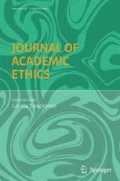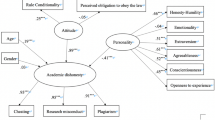Abstract
Extant research (e.g., Wilks et al. 2016; Williams et al. 2010) has shown personality to be a predictor of engagement in academic dishonesty. The current study seeks to determine whether the type of personality measure affects predictive efficacy by comparing single stimulus and forced-choice measures of personality using a sample of 278 undergraduate students in two U.S. universities. Students scoring high on conscientiousness reported as engaging in fewer academic cheating behaviors than those scoring low on conscientiousness regardless of whether conscientiousness was measured using the forced-choice or single stimulus scale format. In addition, the forced-choice and single stimulus measures each contributed significant unique variance to prediction of academic dishonesty. For agreeableness, scores on the single stimulus measure were negatively correlated with academic dishonesty whereas there was a positive relationship found for the forced-choice measure. Overall, the forced-choice format of the Occupational Personality Questionnaire 32r (OPQ32r) did not show higher validities than the single stimulus IPIP counterpart in predicting self-reported academic dishonesty. Implications for future research and management education are discussed.
Similar content being viewed by others
References
Alias, M., Rasdi, R. M., Ismail, M., & Samah, B. A. (2013). Influences of individual-related factors and job satisfaction on workplace deviant behavior among support personnel in Malaysian public service organizations. Human Resource Development International, 16(5), 538–557.
Barrick, M. R., & Mount, M. K. (1991). The big five personality dimensions and job performance: A meta-analysis. Personnel Psychology, 44(1), 1–26.
Bartram, D. (2005). The great eight competencies: A criterion-centric approach to validation. Journal of Applied Psychology, 90(6), 1185–1203.
Bartram, D. (2007). Increasing validity with forced-choice criterion measurement formats. International Journal of Selection and Assessment, 15(3), 263–272.
Bartram, D. (2012). Stability of OPQ32 personality constructs across languages, cultures and countries. In A. M. Ryan, T. L. Frederick, Leong, & F. Oswald (Eds.), Conducting multinational research projects in organizational Psychology: Challenges and opportunities. American Psychological Association.
Beaujouan, Y. (2000). The convergence of the factorial structure of the OPQ (occupational personality questionnaire) towards the five factor model, in seven countries. European Review Of Applied Psychology / Revue Européenne De Psychologie Appliquée, 50(4), 349–357.
Biderman, M. D., Nguyen, N. T., & Sebren, J. (2008). Time-on-task mediates the conscientiousness – Performance relationship. Personality and Individual Differences, 44(4), 887–897.
Clariana, M. (2013). Personality procrastination, procrastination and cheating in students from different university degree programs. Electronic Journal of Research in Educational Psychology, 30(2), 452–472.
Costa, P. T., & McCrae, R. R. (1992). Revised NEO personality Inventory (NEO PI-R) and NEO five factor Inventory (NEO-FFI) professional manual. Odessa: Psychological Assessment Resources.
Giluk, T. L., & Postlethwaite, B. E. (2015). Big five personality and academic dishonesty: A meta-analytic review. Personality and Individual Differences, 72(1), 59–67.
Goldberg, L. R. (1990). An alternative "description of personality": The big-five factor structure. Journal of Personality and Social Psychology, 59(6), 1216–1269.
Harpp, D. N., Hogan, J. J., & Jennings, J. S. (1996). Crime in the classroom part II. An update. Journal of Chemical Education, 73(4), 349–351.
Hicks, L. E. (1970). Some properties of ipsative, normative, and forced-choice normative measures. Psychological Bulletin, 74(3), 167–184.
Hoerger, M. (2013). ZH: An updated version of Steiger's Z and web-based calculator for testing the statistical significance of the difference between dependent correlations. Retrieved from http://www.psychmike.com/dependent_correlations.php
Hogan, R., & Hogan, J. (1995). Hogan personality Inventory manual (2nd ed.). Tulsa: Hogan Assessment Systems.
Hurtz, G. M., & Donovan, J. J. (2000). Personality and job performance: The big five revisited. Journal of Applied Psychology, 85(6), 869–879.
Jackson, D. N., Wroblewski, V. R., & Ashton, M. C. (2000). The impact of faking on employment tests: Does forced choice offer a solution? Human Performance, 13, 371–388. doi:10.1207/S15327043HUP1304_3.
Josephson Institute. (2012, November 20). The 2012 report card on the Ethics of American youth (installment 1: Honesty and integrity). Los Angeles: Josephson Institute of Ethics.
Kepes, S., McDaniel, M. A., Banks, G. C., Hurtz, G. M., & Donovan, J. J. (2011). Big Five Validity and publication bias: Conscientiousness worse than assumed. Chicago: Paper presented at the Annual Conference of the Society for Industrial & Organizational Psychology.
Koljantic, M., & Silva, M. (2002). Comparison of Students' and Faculty's perceptions of occurrence of dishonest academic behaviors. Psychological Reports, 90(3), 883–888.
Lang, J.M. (August, 4, 2013). How college classes encourage cheating. Our universities motivate students to be dishonest. Here’s how to fix them. The Boston Globe, p. K1.
Mc Cabe, D., & Trevino, L. (1993). Academic dishonesty: Honor codes and other contextual influences. Journal of Higher Education, 64(5), 522–538.
Mc Cabe, D., Trevino, L., & Butterfield, K. (2001). Cheating in academic institutions: A decade of research. Ethics and Behavior, 11(3), 219–231.
McCabe, D. L., & Trevino, L. K. (1997). Individual and contextual factors on academic dishonesty: A multi-campus investigation. Research in Higher Education, 38(3), 379–396.
Morgeson, F. P., Campion, M. A., Dipboye, R., Hollenbeck, J. R., Murphy, K., & Schmitt, N. (2007). Reconsidering the use of personality tests in personnel selection contexts. Personnel Psychology, 60(3), 683–729.
Myers, I. B., McCaulley, M. H., Quenk, N., & Hammer, A. (1998). MBTI handbook: A guide to the development and use of the Myers-Briggs type indicator (3rd ed.). Palo Alto: Consulting Psychologists Press.
Newstead, S. E., Franklyn-Stokes, A., & Armstead, P. (1996). Individual differences in student cheating. Journal of Educational Psychology, 88(2), 229–241.
Nguyen, N. T., & Biderman, M. D. (August, 2013). Predicting Counterproductive Work Behavior from a Bi-factor model of Big Five Personality. Orlando: Proceedings of the 2013 academy of management Annual Meeting.
Nguyen, N. T., & McDaniel, M. A. (2000). Faking and forced-choice scales in applicant screening: A meta-analysis. New Orleans: Poster presented at the 15th Annual Meeting of the Society for Industrial & organizational Psychology.
Ones, D. S. (1993). The construct validity of integrity tests. Unpublished doctoral dissertation. Iowa: University of Iowa City.
Ones, D. S., Viswesvaran, C., & Schmidt, F. L. (1993). Comprehensive meta-analysis of integrity test validities: Findings and implications for personnel selection and theories of job performance. Journal of Applied Psychology, 78(4), 679–703.
Ostendorf, F. (1990). Sprache and persönlichkeitstrucktur: Zur Validität des Fünf-faktoren-modells der persönlichkeit [language and personality structure: Toward the validation of the five-factor model of personality]. Regensberg: S. Roderer Verlag.
Parks-Leduc, L., Feldman, G., & Bardi, A. (2015). Personality traits and personal values: A meta-analysis. Personality and Social Psychology Review, 19(1), 3–29.
Plaisant, O., Courtois, R., Réveillère, C., Mendelsohn, G. A., & John, O. P. (2010). Validation par analyse factorielle du big five Inventory Français (BFI-Fr). Analyse convergente avec le NEO-PI-R. = factor structure and internal reliability of the French big five Inventory (BFI-Fr). Convergent and discriminant validation with the NEO-PI-R. Annales Médico-Psychologiques, 168(2), 97–106. doi:10.1016/j.amp.2009.09.003.
Roberts, J. A., & Wasieleski, D. M. (2012). Moral reasoning in computer-based task environments: Exploring the interplay between cognitive and technological factors on individuals’ propensity to break rules. Journal of Business Ethics, 110(3), 355–376.
Salgado, J. F., & Táuriz, G. (2014). The five-factor model, forced-choice personality inventories and performance: A comprehensive meta-analysis of academic and occupational validity studies. European Journal of Work and Organizational Psychology, 23(1), 3–30. doi:10.1080/1359432X.2012.716198.
Salgado, J. F., Anderson, N., & Tauriz, G. (2015). The validity of ipsative and quasi-ipsative forced-choice personality inventories for different occupational groups: A comprehensive meta-analysis. Journal of Occupational and Organizational Psychology, 88(4), 797–834.
Scherer, K. T., Baysinger, M., Zolynsky, D., & LeBreton, J. M. (2013). Predicting counterproductive work behaviors with sub-clinical psychopathy: Beyond the five factor model of personality. Personality and Individual Differences, 55(3), 300–305. doi:10.1016/j.paid.2013.03.007.
SHL Group. (2009-2011). OPQ32r Technical manual. Thames Ditton, United Kingdom: Author.
Steiger, J. H. (1980). Tests for comparing elements of a correlation matrix. Psychological Bulletin, 87(2), 245–251.
Stone, T. H., Kisamore, J. L., & Jawahar, I. M. (2008). Predicting students' perceptions of academic misconduct on the Hogan personality Inventory reliability scale. Psychological Reports, 102(2), 495–508. doi:10.2466/PR0.102.2.495-508.
Stone, T. H., Jawahar, I. M., & Kisamore, J. L. (2010). Predicting academic misconduct intentions and behavior using the theory of planned behavior and personality. Basic and Applied Social Psychology, 32(1), 35–45.
Szarota, P. (1996). Taxonomy of the Polish personality descriptive adjectives of the highest frequency of use. Polish Psychological Bulletin, 27, 342–351.
Vedel, A. (2014). The big five and tertiary academic performance: A systematic review and meta-analysis. Personality and Individual Differences, 71(1), 66–76.
Wesolowsky, G. O. (2000). Detecting excessive similarity in answers on multiple choice exams. Journal of Applied Statistics, 27(7), 909–921.
Whitley Jr., B. E. (1998). Factors associated with cheating among college students: A review. Research in Higher Education, 39(3), 235–274.
Whitley, B. E., Nelson, A. B., & Jones, C. J. (1999). Gender differences in cheating attitudes and behavior: A meta-analysis. Sex Roles, 41(9), 657–680.
Wilks, D. C., Cruz, J. N., & Sousa, P. (2016). Personality traits and plagiarism: An empirical study with Portuguese undergraduate students. Journal of Academic Ethics, 14(3), 231. doi:10.1007/s10805-016-9261-y.
Williams, K. M., Nathanson, C., & Paulhus, D. L. (2010). Identifying and profiling scholastic cheaters: Their personality, cognitive ability, and motivation. Journal of Experimental Psychology: Applied, 16(3), 293–307.
Author information
Authors and Affiliations
Corresponding author
Rights and permissions
About this article
Cite this article
Hendy, N.T. Forced-Choice Personality Measures and Academic Dishonesty: a Comparative Study. J Acad Ethics 15, 293–306 (2017). https://doi.org/10.1007/s10805-017-9280-3
Published:
Issue Date:
DOI: https://doi.org/10.1007/s10805-017-9280-3



